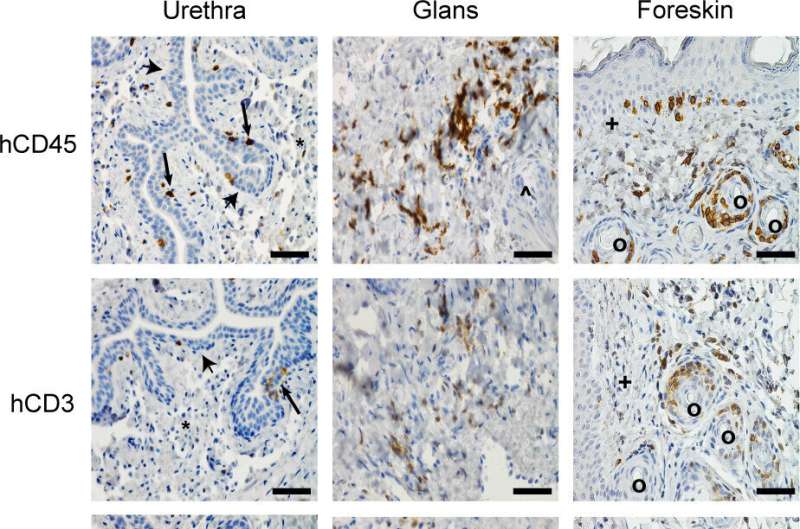This article has been reviewed according to Science X's editorial process and policies. Editors have highlighted the following attributes while ensuring the content's credibility:
fact-checked
peer-reviewed publication
trusted source
proofread
Penile HIV infection is effectively prevented by antiretroviral treatment, finds study

Of the 38 million people worldwide living with HIV, approximately 700,000 are newly infected men, primarily via sexual transmission. Sexually transmitted HIV infections in exclusively heterosexual men are acquired through the penis. In addition, semen which is produced in the male genital tract (MGT) has been recognized as the primary vector for vaginal and rectal HIV transmission. Notably, the risk of sexual HIV transmission increases with the presence of a concurrent sexually transmitted infection.
For the majority of patients, antiretroviral therapy (ART) rapidly decreases the viral load in blood and semen, and this results in a dramatic reduction in HIV transmission. However, in some individuals with an undetectable plasma viral load, HIV and HIV-infected cells may persist in tissues despite ART. Therefore, the origin of virus present in semen is highly relevant to the implementation of new therapies aimed at effectively reducing HIV transmission. Yet the direct evaluation of HIV infection throughout the entire MGT has not been possible, until now.
Led by Martina Kovarova, Ph.D., member of the laboratory of J. Victor Garcia, Ph.D., a team of researchers at the International Center for the Advancement of Translational Science and Institute for Global Health and Infectious Diseases at UNC addressed three critical issues of HIV transmission: How is HIV acquired via the penis; where is HIV produced in the MGT; and can penile HIV acquisition be prevented? For this they implemented a novel in vivo model that permits, for the first time, a detailed analysis of HIV infection throughout the entire male genital tract. Using this mouse model, the team showed that productive HIV infection occurs in all the organs that comprise the male genital tract, resulting in a dramatic reduction in human CD4 T cells, key components of the immune system present in these organs.
The research is published in the journal mBio.
"Previous work addressing HIV infection in men was focus on rectal transmission and its prevention. The importance of this study is that it addresses a different mode of HIV transmission that is of fundamental importance to HIV prevention in heterosexual men. We have established the sites of HIV production throughout the entire male genital tract, demonstrated how it can be suppressed, and that pre-exposure prophylaxis with an antiviral drug can prevent penile HIV infection," said J. Victor Garcia, Ph.D., Director of the International Center for the Advancement of Translational Science at UNC and senior author of the study.
The study approach began with an in depth analysis of the entire MGT (foreskin, urethra, glans, epididymis, seminal vesicles, prostrate, and testes) for the presence of human immune cells. Results showed that the entire MGT of these mice was repopulated with human T and myeloid cells, important targets of HIV infection. The investigators demonstrated that regardless of the route of infection HIV is produced in all tissues of the MGT and that HIV production can be efficiently suppressed by treatment with the antiviral drug EFdA (4'-Ethynyl-2'-fluoro-2-deoxyadenosine). Drug treatment had the added benefit of restoring the levels of CD4+ T cells throughout the MGT and other tissues.
Having established the susceptibility of the cells in the MGT to HIV infection, the investigators determined whether HIV infection in this model could occur after direct exposure to HIV via the penis. Direct penile exposure to HIV led to HIV replication throughout the MGT, systemic infection and depletion of CD4+ T cells in all tissues analyzed. The investigators then determined whether treatment with EFdA prior to direct penile exposure could prevent HIV infection. Their results demonstrated that pre-exposure prophylaxis with EFdA administered orally can efficiently prevent HIV acquisition via the penis.
"EFdA is a new highly effective anti-HIV drug that we used as a tool to directly demonstrate the great potential of pre-exposure prophylaxis to prevent penile HIV infection. Consistent with the important concept of treatment as prevention pioneer by Myron Cohen, MD Director of the Institute for Global Health at UNC and co-author of this paper, our work also shows the efficient suppression of HIV replication throughout the entire MGT by antiretroviral treatment," said Martina Kovarova, Ph.D., first author on the study. "We will be able to use this animal model to study the mechanism of HIV acquisition and HIV transmission via the MGT. This will also allow us to evaluate new strategies for HIV treatment in general and for HIV prevention after penile exposure."
The research team also included Sarah E. Wessel, Claire E. Johnson, Shelby V. Anderson, Mackenzie L. Cottrell, and Craig Sykes.
More information: Martina Kovarova et al, EFdA efficiently suppresses HIV replication in the male genital tract and prevents penile HIV acquisition, mBio (2023). DOI: 10.1128/mbio.02224-22



















